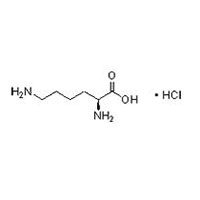Synonyms
H-Lys-OH.HCl
MFCD00064564
L-Lysinehydrochloride
(2S)-2,6-Diaminohexanoic acid monohydrochloride
L-Lysine, monohydrochloride
L-LYS HCL
Lysine hydrochloride
L-Lysine HCl
LYSINE-L HCL
L-Lysine hydrochloride
Product Description
L-Lysine hydrochloride is a highly purified form of the essential amino acid L-lysine, commonly used as
a food additive in the food industry. It is produced by the hydrochlorination of L-lysine, resulting in
the formation of L-lysine hydrochloride crystals, which are then refined to a fine powder.
As an essential amino acid, L-lysine cannot be synthesized by the human body and must be obtained from
the diet. L-lysine is essential for protein synthesis, tissue repair, and the production of collagen, an
important component of skin, tendons, and bones. In the food industry, L-lysine hydrochloride is added
to a variety of foods, including meats, dairy products, and processed foods, as a nutritional supplement
to increase the protein content and improve the quality of the protein.
L-lysine hydrochloride has several benefits when used as a food additive. It can improve the nutritional
value of foods by increasing the protein content and improving the quality of the protein. It also has
the ability to enhance the flavor and aroma of foods, making them more appealing to consumers.
Additionally, L-lysine hydrochloride can act as a preservative, helping to prevent spoilage and extend
the shelf life of foods.
L-lysine hydrochloride is generally recognized as safe (GRAS) by the US Food and Drug Administration
(FDA) and has been approved for use in foods for many years. It is important to note, however, that
excessive consumption of L-lysine can cause adverse effects, such as nausea, diarrhea, and abdominal
cramps.
In conclusion, L-lysine hydrochloride is a valuable food additive that can improve the nutritional
value, flavor, and shelf life of foods. It is commonly used in the food industry and has been shown to
be safe for consumption in appropriate amounts.





